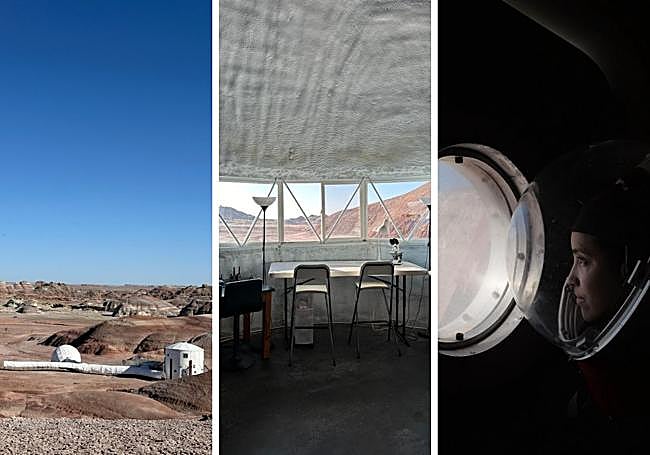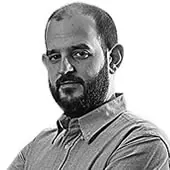The woman from the south of Spain who conquered Mars: 'It has changed my life'
Alba Sánchez has completed her mission in the simulator in the desert in Utah where she spent two weeks in isolation with an international team of young researchers
Alba Sanchez is working late in the laboratory at the University of Leuven. She arrived back a week ago and is still recovering. "I am returning to reality, it has been a spectacular experience," says the biotechnologist from Granada.
"The landscapes we had were immense. It was crazy. Everything was so real, so immersive, that I came to believe in the journey. I thought I was on Mars," Alba says.
On 28 March a team of seven young researchers from around the world landed in the desert in Utah, USA. They were the new crew of the Mars UCLouvain mission, the most realistic simulation possible - without leaving Earth - of a space station on Mars.
"When we saw the facility we were shocked," recalls Alba. "It was bigger than we thought. It was mind-blowing." The complex includes laboratories, a greenhouse, an observatory and living quarters. All under strict living conditions as close as possible to those on the red planet. "As soon as we arrived we did a three-hour training session to learn what we had to do every day, how to communicate with the control centre in case of an emergency. After that, the isolation began."

Zoom

Alba and her team stayed at the station for thirteen days, during which time they had to complete several scientific experiments: analysis of meteorological parameters, terrain mapping, use of technologies, drone manoeuvres, particle studies, and so on. But to do all this, they had to go out into the inhospitable valleys of Mars. "I had very high expectations, but when I put on the suit, it surpassed all of them."
The schedule was the same every day. The alarm would go off at seven o'clock, then breakfast and the exploration shift. "We went out in groups of four, so we took turns. There was only one morning we couldn't go out because there was a big sandstorm and it was dangerous. The rest of it was incredible. The space suit, the harness, the belt, gloves, boots," Alba says, adding, "Everything was absolutely real, so that not a centimetre of the body was in contact with the air. We also had the radio system in the helmet, so we could communicate with each other."
Before stepping out onto the rocks of Mars they waited five minutes in a small decompression chamber. Once outside, the rover was waiting for them. "We'd get in the rover and go around the area. Then we would walk around a lot. During the exploration, I was amazed because even though I knew it was a simulation, I thought it was Mars: you couldn't see anything but the desert, the land, your companions.... You couldn't hear anything else. It was so real."
The trips lasted between two and three hours. "They were very tiring. On the way back to the station they would help us take off our suits. And there was always a special euphoria on the way home: you've done it! Good job!" exclaims Alba.
Freeze-dried food
Those who did not go out on mission were in charge of the kitchen, which was no easy task. "The freeze-dried food thing went surprisingly well. We had cubes of all kinds of products: carrots, potatoes, chicken, hamburger meat. We had to hydrate them in a pan of boiling water and then we could do something with them. Cooking was a real adventure, some of us even managed pizzas!"
After lunch the team spread out in the labs to work on their personal projects. In addition, they had to report to the control centre every day. "We each had a specific task within the station. I was in charge of communication, so I prepared a daily summary with photos and videos," explains Alba.
The evenings consisted of dinner, a group meeting and some activity together: "Card games, mime games... anything to make a team. We had a great time. We learned a lot".
- What was the big lesson?
-What I take away most from the experience is the realisation of how small I am. How big what we have around us is, that we are nothing, that we have to make the most of every moment and give our best. It has changed my life. I am in a moment of change, to be honest. Mars has had more impact than I thought it would have.
Now back in the lab, Alba knows what she wants to do after her PhD. "I'd love to follow this path and see if I can get there," she says, adding, "It was an unfulfilled dream and this has been so fulfilling that I want to give it a go. I'm going to apply to be an astronaut candidate for the European Space Agency.
Mars was just the beginning. The journey continues.

-kriB--1200x840@Ideal.jpg)